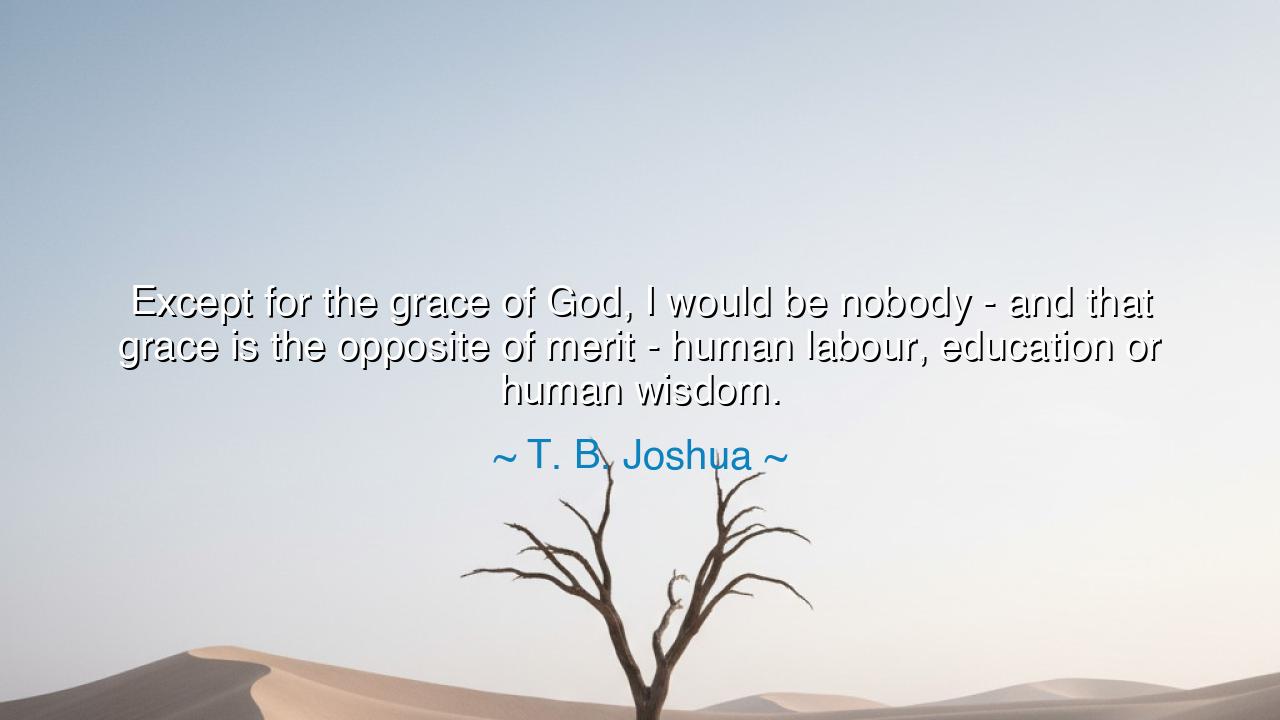
Except for the grace of God, I would be nobody - and that grace
Except for the grace of God, I would be nobody - and that grace is the opposite of merit - human labour, education or human wisdom.






In the humble and soul-stirring words of T. B. Joshua, “Except for the grace of God, I would be nobody — and that grace is the opposite of merit — human labour, education or human wisdom.” These words are not the cry of a man boasting of faith, but the confession of one who has looked upon the vastness of life and seen his own smallness reflected within it. For in them lies the ancient truth: that all greatness, all wisdom, and all strength are but gifts of grace, not the works of human striving. Grace — that mysterious, divine favor which cannot be earned nor explained — descends not upon the proud, but upon the humble heart that bows before the Eternal.
The origin of this saying rests deep in the wellspring of divine tradition. Since the dawn of faith, prophets, saints, and sages have echoed this same truth. The psalmist of Israel sang, “Not unto us, O Lord, not unto us, but unto Thy name give glory.” The Apostle Paul declared, “By the grace of God I am what I am.” In these sacred echoes, T. B. Joshua stands as a modern voice among the ancients — a witness to the eternal law that divine grace surpasses human effort. For while men chase after success through labour, education, and wisdom, the hand of heaven lifts whom it wills, often choosing the least likely, that all may know the power belongs not to man, but to God.
When he spoke these words, T. B. Joshua was not speaking from theory, but from the testimony of his own life. Born into poverty in a small village in Nigeria, he had none of the privileges of education or status that the world esteems. Yet from those humble beginnings, he rose to become a voice that reached across nations. His life was a living testament to what he proclaimed — that grace alone can raise a man from the dust and set him among princes. For when the human hand can take no credit, the divine hand is seen most clearly. Thus, he spoke not as a scholar or philosopher, but as one who had been carried by mercy.
Consider, too, the life of Moses, that ancient shepherd who once fled Egypt a fugitive, unlearned in the ways of kings. Yet it was he whom God chose to deliver Israel from bondage and to stand upon Sinai, speaking face to face with the Almighty. What human merit had he? None — only obedience and humility. His education in Pharaoh’s courts did not qualify him; his eloquence failed him; yet grace clothed him with power. It is ever thus in the stories of old — from David, the shepherd boy turned king, to Mary, the young maiden who became the mother of salvation. The grace of God overturns the logic of the world and exalts the lowly.
Human labour, though noble, reaches only so far; education, though valuable, cannot teach the mysteries of destiny; wisdom, though precious, cannot open the gates of heaven. For there is a divine current that runs deeper than effort — a river of grace that carries the soul where no strength of oar or sail can go. When T. B. Joshua said, “Grace is the opposite of merit,” he meant that the divine does not weigh us on scales of worthiness. It is not the learned who are always wise, nor the strong who are always chosen. Grace finds its own, often among the broken, the forgotten, and the undeserving.
Yet this truth is not meant to make us idle or complacent. Rather, it calls us to humility. For though our hands must work, and our minds must learn, we must never forget that all fruitfulness is sustained by a power greater than our own. The farmer plants and waters, but it is heaven that gives the rain. The scholar studies, but it is grace that grants understanding. The leader plans, but it is divine mercy that brings the plan to life. Thus, grace does not cancel human effort — it completes it. It takes what is small and breathes eternity into it.
The lesson, dear listener, is both tender and profound: walk humbly, for all that you are is a gift. Strive, but never boast. Learn, but never forget the Source of all wisdom. Labour, but remember that strength itself is lent to you by grace. When you rise in success, give thanks; when you fall into weakness, do not despair — for even there, grace abides. Let this truth guide your steps: that the greatest among men are those who recognize they are nothing without the divine hand that sustains them.
So let us live as T. B. Joshua taught — not by merit, but by mercy. For it is grace, not human greatness, that crowns the soul. And when all achievements fade like smoke, it is only this truth that endures: “Except for the grace of God, I would be nobody.” These are not words of sorrow, but of freedom — the freedom to rest in the knowledge that we are shaped not by our worth, but by His wondrous will.






AAdministratorAdministrator
Welcome, honored guests. Please leave a comment, we will respond soon